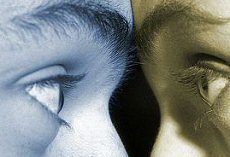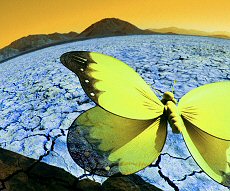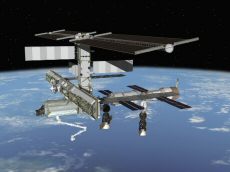The evolutionary benefits of crying
Crying is known to be a symptom of pain or stress, but an evolutionary biologist believes that tears are also an evolution-based mechanism to bring people closer together and make interpersonal relationships stronger...
17 July 2009
Male chromosome facing extinction
The male sex chromosome, the Y chromosome, is evolving at a much more rapid pace than the X chromosome, and researchers say that it is losing genes at a rate that eventually could lead to the Y chromosome's complete disappearance...
10 July 2009
Ugly males more fertile
Attractive males release fewer sperm per mating to increase the odds of producing offspring across a range of females, suggesting that matings with attractive males may be less fruitful than those with unattractive ones...
13 January 2009
Humans reshaping other species at lightning speed
Human activities such as fishing and hunting are having astonishingly broad and swift impacts on the body size and reproductive abilities of fish and other commercially harvested species, potentially jeopardizing the ability of entire populations to recover, according to a new study...
9 December 2008
Credit card maxed out? Blame your sex drive
Foreclosures, credit card debt, bank bailouts - all symptoms of compulsive overspending, which a University of Michigan researcher believes can be explained by evolution and men's need to procreate...
3 December 2008
The "perfect" body not always perfect
The hormones that make women physically stronger, more competitive and better able to deal with stress also tend to redistribute fat from the hips to the waist, which means that having an imperfect body may come with substantial benefits for some women...
12 November 2008
Adaptive proteins "control" their own evolution
A previously hidden mechanism that guides the way biological organisms respond to the forces of natural selection has been observed making the proteins found in most living organisms behave like adaptive machines, subtly directing aspects of their own evolution to create order out of randomness...
27 August 2008
Honey, We Shrunk The Cod
New research has added further weight to the controversial idea that overfishing by humans is driving rapid evolutionary change in fish, making them smaller and less fecund while driving commercially valuable species like cod to the brink of economic extinction...
26 August 2008
Size Of Genitalia Dependent On Need To Fight
Researchers examining male horned beetles from four geographically separated populations say the groups have diverged significantly in the size of the male genitalia, and natural selection operating on the other end of the animal – the fighting horns atop the beetles' heads – seems to be driving it much more quickly than expected...
20 August 2008
Melanoma Not Without Benefits
In male swordtail fish, black melanoma splotches help lure females, suggesting that the usually deadly melanoma gene is conserved for its beneficial role in sexual selection...
18 June 2008
Male Homosexuality Placed In Darwinian Context
Italian researchers say that male homosexuality in humans can be explained by a model based on sexually antagonistic selection; where genetic factors spread in the population by giving a reproductive advantage to one sex while disadvantaging the other...
18 March 2008
1st Rule Of Evolution: Strive For Complexity
UK scientists have revealed what may well be the first "rule" of evolution - a pervasive drive to become increasingly more complex...
11 December 2007
Modern Man In Evolutionary Fast Lane
Driven by exponential population growth and cultural shifts, the past 40,000 years have been a time of supercharged evolutionary change for humans...
30 November 2007  Skin Deep
Skin Deep
While the bad old days of an overt "whites only" policy could be dismissed as consciously constructed segregation, more recent types of racism seem to be "unconscious," below-the-surface manifestations. But do these cases of unconscious racism suggest that racism is a product of evolution?
5 November 2007
Evolutionary Risk Distribution Law Identified
When do cells retain specific gene sequences, and when do they allow evolution to experiment with them? New research indicates that a sort of "risk distribution law" is in effect...
5 October 2007
Fish Hatcheries Cause Stunning Loss Of Reproductive Fitness
Trout raised in hatcheries suffer a dramatic and unexpectedly fast drop in their ability to reproduce in the wild...
28 August 2007
Shifting Evolution Up A Gear
New research suggests that "moving the goalposts" may be one method of speeding-up evolutionary change...
13 July 2007  Evolution And The Hive Mind
Evolution And The Hive Mind
Would it be too far fetched to suggest that social pressures could affect brain function at a genetic level? One study has identified collective behavioral differences between the United States and China, possibly suggesting the beginning of brain divergence among humans...
27 June 2007
Did Trichromatic Vision Evolve Because of Colorful Bottoms Or Colorful Fruit?
Ohio University researchers believe they have shown that trichromatic color vision (the ability to discriminate red from green) was present in some primates long before it became a method of sexual communication...
13 June 2007
Researchers Ponder Primordial Broth
Scientists contemplating the primordial brew that all life sprang from are getting closer to understanding how simple chemicals, which have no self-interest, can become "biological" and driven to evolve by natural selection...
1 June 2007  The Personal Face Of Evolution
The Personal Face Of Evolution
Research suggesting that animals – from primates to mollusks – have personalities means that scientists are now asking intriguing questions regarding the evolutionary significance of personalities, and the advantages and disadvantages that different types of personality can confer...
25 May 2007  Turbocharged Evolution
Turbocharged Evolution
Instead of waiting for nature's sluggish hit-and-miss process of producing a viable adaptation or mutation, researchers have shown that it may be possible to engineer evolutionary processes in a fraction of the time. Specifically, recent research on synthetic proteins indicates that there may be no limits or time constraints on human evolution – should we so choose...
19 April 2007
Mites Re-Evolve Sexual Reproduction
After millions of years of asexual reproduction, a family of mites has taken the unusual step of resuming sexual reproduction...
20 March 2007
Sex Optional For Evolutionary Adaptation
Micro-organisms that gave up on sex 40 million years ago have nevertheless managed to evolve into distinct species; challenging the assumption that sex is necessary for organisms to diversify...
16 March 2007
Chill Out To Evolve
Species don't evolve faster in warmer climes as had been thought; rather, it is cooler regions that crank-up speciation rates...
16 February 2007  Is Evolutionary Development Like Flat-Pack Furniture?
Is Evolutionary Development Like Flat-Pack Furniture?
Could horizontal gene transfer that occurred in the distant past account for the incredible development of the human brain, and the subsequent human-chimp split? If so, what piece of vital genetic information did we acquire that gave us our cognitive edge?
12 February 2007
Prof Questions Darwinian Dogma
Cell biology seems to run contrary to the model that most people have in their heads, says a Darwinian detractor...
30 January 2007
Horizontal Gene Transfer Accelerating Evolution
Sexual selection and random genetic mutations are slowpokes in the evolution stakes, say scientists who are modeling the evolutionary effects of horizontal gene transfer...
11 January 2007
Females Get Into Sexual Selection Game
Stiff competition amongst breeding female meerkats suggests novel selection pressures previously only seen in male animals...
2 January 2007
Human Brain Evolution Slows To A Crawl
The human brain underwent explosive growth after we split from our chimp cousins, but the pace of evolutionary change among the thousands of genes expressed in brain tissue has slowed since then...
17 November 2006
Lizards Pushed Into Evolutionary Fast Lane
Evolutionary biologists have witnessed natural selection dramatically change direction in a very short period of time...
24 October 2006
Shrinking Food Supply Leads To Shrinking Brain
Scientists studying orangutans in Indonesia have evidence for an evolutionary connection between food availability and brain size...
26 September 2006
Stealth And Sacrifice Show Evolution At Work
Male crickets on the Hawaiian Island of Kauai have lost their noise-making ability but have adapted their behavior in an ingenious manner to continue to meet up with female crickets...
14 August 2006
America: In Evolution We Don't Trust
One in three American adults firmly rejects the concept of evolution, a significantly higher proportion than found in any western European country...
16 June 2006
HIV's Virulence An Evolutionary Accident
The high virulence of HIV-1 might be due to an accident of evolution. Researchers believe that gene function lost during the course of viral evolution predisposed HIV-1 to instigate the fatal immune system failures that are its hallmark...
13 June 2006
Researchers Investigate Giant Sperm Paradox
The sperm of certain male fruit flies (drosophila bifurca) is 20 times longer than the creature itself, presenting evolutionary biologists with a cryptic conundrum...
18 May 2006
Early Humans And Chimps Much More Than Just Good Friends
Early humans still had the hots for their chimp cousins and possibly interbred with them, suggesting that the evolutionary divergence is much more recent – and more complicated – than previously thought...
24 February 2006
Food For Thought
Was it a shoreline diet rich in iodine that triggered explosive brain growth in early hominids? One scientist thinks so, although his detractors maintain that language and tool-use were the catalysts for our big brains...
17 February 2006
Sex – Evolution’s Janitor
Sexual reproduction is a complicated, biologically costly business and researchers now think they know what it is about sex that justifies such a big energy investment...
20 January 2006
Evolution Makes A Mockery Of Fishing Policy
Fisherman take the largest individuals from a fish population, creating evolutionary pressure that selects for smaller, less viable fish, and because the changes are genetic, they don’t immediately normalize when fishing ceases...
17 January 2006
Darwin's Dilemma Solved?
Two biologists may have answered one of evolutionary theory’s most puzzling questions, by explaining the seemingly random genetic changes that organisms undergo...
9 December 2005
Balls vs Brains In Batty Battle For Evolutionary Success
Testes that account for around 10 percent of body mass? Fascinating new research into mammalian sexual selection has found that bats have evolved this way, but at the expense of brain size...
15 November 2005
Drug Gene Link To Human Evolution
A gene that is believed to play a role in human perception and drug dependence is expressed more readily in humans than in other primates, indicating a split in our evolution...
28 October 2005
Asexual Reproduction The First Step To Extinction
Scientists studying asexual fungi believe that asexual reproduction could be the first step on the road to extinction...
23 September 2005  Missing Link A Tripping Chimp?
Missing Link A Tripping Chimp?
New research into prehistoric dietary habits suggests that the humans who split from their chimp cousins seven million years ago may have subsisted on roots and tubers that they foraged from under the savannah. Interestingly, one particular root contains psychoactive compounds that can cause effects similar to the drug LSD. Could it be that human intelligence was jump-started in chimps thanks to a mind-expanding trip?
23 September 2005
Insight Into Eye Evolution Deals Blow To Intelligent Design
The human eye is one of nature's most complex works, which Intelligent Design advocates often cite as proof of an overarching creator. But new research has uncovered the missing evolutionary link between simple invertebrate eyes and our own sophisticated vision system...
9 September 2005
Key Points In Brain Evolution Identified
Ongoing natural selection in humans means our brains are still evolving, say researchers who have found that two previous evolutionary jumps coincided with key points in human history...
19 August 2005
Intelligent Design Down Under
It’s not hard to see how Intelligent Design could gain a strong foothold in the United States. After all, America’s puritanical roots and the robustness of its bible belt, coupled with a clueless administration, should ensure that Intelligent Design will co-habit with evolutionary theory throughout the nation’s schools. But Intelligent Design has opened up a new front south of the border - Australia. And our convict descended buddies were a tad shocked when Brendan Nelson, the Australian Federal Education Minister, said that Intelligent Design should be taught alongside the theory of evolution in Australian schools...
28 July 2005
Autism, Asperger’s and Evolution
What is the difference between a genetic abnormality and genetic evolution? Is the human body’s adaptability responsible for many of the conditions that we call mental disorders? Researchers concede that the science world is still in the dark about the causes of autism and asperger’s disorder, but do believe that autism and asperger’s are most likely genetically oriented. Is it possible that in disorders such as autism and Asperger’s we are witnessing evolution at work?
17 June 2005
Evolution Appears To Be A Start-Stop Affair
Evolutionary theory says that continuous alterations occur during the course of genome evolution, but some regions of the human genome exist in a long stasis, "punctuated" by relatively brief episodes of activity...
3 June 2005
Inherited Disease Findings Stir Evolutionary Debate
Findings that a disease that affects you today could be the result of one of your ancestors being exposed to an environmental toxin during pregnancy are sure to stir the old evolutionary blank-slate debate...
20 May 2005
Halting Evolution To Fight Illness
Researchers working with the bacterium E. coli have demonstrated a new way of fighting antibiotic resistance: by stopping evolution...
21 January 2005
Genetic Gradient Theory Challenges Evolutionary Ideas
The results of research into gradually changing genetic traits could have profound implications for current approaches to conservation...
22 December 2004
Promiscuous Proteins Provide Evolutionary Shortcuts
Proteins that indulge in so-called promiscuous activities can provide nature with ready-made starting points for the evolution of new functions...
10 November 2004
Promiscuous Females Make For Competitive Sperm
Females that mate with many partners create selective pressure for the male to make his semen more competitive...
16 August 2004
Prions Role In Evolution Revealed
Prions help cells navigate the risky business of natural selection by expressing a variety of hidden genetic traits...
11 August 2004
Evolution Itself Subject To Natural Selection
Scientists suggest that the ability to reorder genes or to cause large-scale genetic change are themselves genetic traits, traits that are subject to selection like any others...
9 August 2004
Big Brain Evolved Through Social Problem Solving
Open-ended thinking and social problem solving led human brains to surpass other species in size, developing ecological dominance 2 million years ago...
23 February 2004
Forced Mutations Demonstrate Evolution In Action
An experiment which forced E. coli bacteria to adapt or die demonstrated that they were capable of improvising a novel molecular tool to save themselves...
17 November 2003
Evolutionary Changes Not Always Small
The theory that a species evolves by going through a large number of small genetic changes may not be completely accurate...
22 May 2003
Superfast Evolutionary Change In Mice Observed
Changes in mice over just 150 years suggest genetic evolution can occur a lot faster than many had thought possible...
17 February 2003
A Revolution In Evolution
Darwin may have been wrong about sex. Or at least too narrow minded. There is growing evidence that Darwin's idea of sexual selection requires sweeping revisions...
21 April 2002
New Insight Into Basic Mechanism Of Evolution
The basic cellular machinery that generates the genetic diversity central to evolution does not operate quite the way scientists have thought...







 Birds Ain’t Doing It, Bees Ain’t Doing It, And Biodiversity Is The Victim
Birds Ain’t Doing It, Bees Ain’t Doing It, And Biodiversity Is The Victim